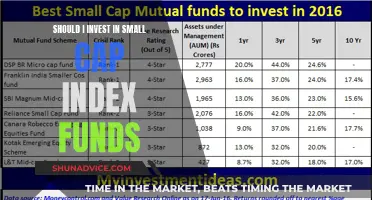
Currency funds can be a great way to diversify your portfolio, especially if it is heavely focused on US equities. Currency investing has become increasingly popular as economic uncertainty grips the globe. The foreign exchange market (forex) is a 24-hour marketplace where currencies are traded, and it is now accessible to the average investor, not just multinational corporations and well-financed investors. Currency ETFs, for example, can be used to speculate on currency valuations and allow investors to make trades without needing to make individual currency trades. There are risks associated with currency investing, including volatile markets and fluctuating exchange rates, but there are also potential benefits such as portfolio diversification, speculative trades, lower transaction fees, and low management fees.
| Characteristics | Values |
|---|---|
| Diversification | Currency funds can be used to balance a portfolio, especially if it is heavily focused on US equities. |
| Level Playing Field | The news that drives currency prices is available to everyone in real time. There are no "insiders" in the foreign exchange market. |
| Global Economic Hedge | Currency funds allow investors to select currencies based on how they perceive their relative values will change over time. |
| Capital Appreciation | Currencies offer the potential for capital appreciation. |
| Hedge Against Political and Event Risk | Currencies can be played against each other based on a tactical assessment of important events around the world. |
| Low Transaction Fees | Currency funds allow investors to gain ongoing exposure to the forex market without having to pay the transaction fees involved in buying and selling currencies. |
| Low Management Fees | Currency funds are often not actively managed, so the management fees tend to be low. |
What You'll Learn
- Currency funds can be a good way to diversify your portfolio, especially if it is heavily focused on US equities
- Currency funds can be used to hedge against political and event risk
- Currency funds can be a good way to speculate on currency valuations
- Currency funds can provide access to foreign currencies without the need for individual currency trades
- Currency funds can be a good investment option for casual investors who want to avoid the complex workings of the forex market

Currency funds can be a good way to diversify your portfolio, especially if it is heavily focused on US equities
Currency investing has become more popular as economic uncertainty has spread across the globe. Historically, trading currencies was reserved for multinational corporations and well-financed investors, but the market has now opened up to the average investor.
The foreign exchange market (forex) is where currencies are traded. For multinational companies, this market provides a means of doing business in other countries, facilitating the payment of bills in the local currency. For speculators, this market provides opportunities to take advantage of movements in exchange rates.
One of the benefits of investing in currency funds is that you can use them to balance your portfolio. For example, if you believe the dollar will drop in the future, you can buy one or more currencies that you think will rise. Currencies move relative to each other, so when one is rising, another is falling. This is different from stocks, which move independently of each other.
Currency funds can also provide a level playing field. Unlike stocks, the news that drives currency prices is available to everyone in real time. In theory, there are no "insiders" in the foreign exchange market, which operates 24 hours a day around the world. Since currency valuations are driven by actual monetary flows and events that influence a country's economic health, you can do your own analysis of how these events might impact a particular currency.
Additionally, currency funds can act as a global economic hedge. For example, there is a growing fear that current US fiscal and monetary policies will generate inflation and weaken the dollar over time. Currency funds allow you to select currencies based on how you perceive their relative values will change over time. You can bet both ways, either long or short, depending on which direction you think a particular currency is headed. You can allocate your risk across the currencies of several countries, allowing you to profit from changing global macroeconomic conditions.
Finally, currency funds can provide capital appreciation. Currencies offer the potential for capital appreciation, similar to commodities and stocks. If the value of your chosen currencies rises against the dollar, you will profit.
In conclusion, currency funds can be a good way to diversify your portfolio, especially if it is heavily focused on US equities. They provide a level playing field, allow for global economic hedging, and offer the potential for capital appreciation. However, it is important to note that investing in currencies comes with risks, including exchange rate risk, transaction risk, and political risk.
AI Investment: Top Funds to Watch
You may want to see also

Currency funds can be used to hedge against political and event risk
Currency funds offer investors the ability to diversify their portfolios and balance their risk exposure. By investing in currency funds, investors can gain exposure to a range of currencies and reduce their dependence on a single currency. This diversification can help mitigate the impact of negative events in a particular country or region.
Additionally, currency funds can provide a hedge against inflation and currency devaluation. For example, if an investor holds a currency that is expected to strengthen relative to others, they can profit from the capital appreciation of that currency. This can be particularly attractive in times of economic uncertainty or high inflation, where traditional assets may struggle to keep up with the rising cost of living.
Furthermore, currency funds can be used as a tool for speculation and tactical asset allocation. By assessing global events and their potential impact on currency values, investors can make strategic bets on the direction of currency movements. This allows investors to profit from their insights and analysis of global economic and political events.
It is important to note that investing in currency funds carries risks, including high volatility and the potential for significant short-term losses. Investors should carefully consider their risk tolerance and conduct thorough research before investing in currency funds.
Bloomberg's Best Investment Fund Options: Where to Start?
You may want to see also

Currency funds can be a good way to speculate on currency valuations
Currency funds are a good way to speculate on currency valuations because they allow investors to take advantage of movements in exchange rates. Currencies are traded in pairs, so when one currency rises, the other falls, and investors can bet on these relative movements. For example, if an investor believes the dollar will drop in value, they can buy one or more currencies expected to rise. This strategy can be used to hedge against the risk of a declining dollar.
Currency funds also offer portfolio diversification, especially for investors with portfolios heavily focused on US equities. They can be used to balance a portfolio by investing in currencies with different risk profiles. Additionally, currency funds can provide access to foreign markets and global macroeconomic trends. For instance, an investor could bet on the long-term decline of a particular currency due to a country's economic policies.
Furthermore, currency funds can be a good way to gain exposure to foreign currencies without the need to trade on the forex market directly. Currency-linked ETFs, for instance, can be purchased through existing brokerage accounts, and they often have lower transaction and management fees. However, it is important to note that currency investing is subject to risks, including volatile markets, fluctuating exchange rates, and the impact of global events.
Best Mutual Funds for Short-Term Investments
You may want to see also

Currency funds can provide access to foreign currencies without the need for individual currency trades
Currency ETFs offer several advantages over traditional currency trading. Firstly, they provide investors with exposure to the forex market without the need to make individual currency trades. This simplifies the investment process and eliminates the need for specialised knowledge or experience in currency trading.
Secondly, currency ETFs can be traded through existing brokerage accounts, making them more accessible to investors who may not have access to the forex market directly. They also benefit from lower transaction fees compared to buying and selling currencies directly. Additionally, currency ETFs tend to have low management fees since they are often passively managed.
Furthermore, currency ETFs can be used as a hedging tool against currency risks. For example, investors can short a currency ETF to hedge against potential losses due to unfavourable exchange rate movements. Currency ETFs can also be used to speculate on currency valuations by pairing them against other currencies.
While currency ETFs offer these advantages, it is important to consider the associated risks. Currency-linked ETFs, especially leveraged and inverse ETFs, are subject to market volatility and rapidly fluctuating exchange rates. The complexity of currency markets and the impact of global events can significantly influence the performance of currency ETFs.
Protect Your 401k: Invest in Mutual Funds for a Secure Future
You may want to see also

Currency funds can be a good investment option for casual investors who want to avoid the complex workings of the forex market
The foreign exchange market, or forex, is where the world's currencies are traded 24 hours a day. It is a complex and volatile market that can be difficult for casual investors to navigate. Currency funds, on the other hand, offer a simpler way to invest in currencies without having to learn the intricacies of the forex market.
One option for casual investors is to invest in currency exchange-traded funds (ETFs). These are designed to track the performance of a single currency against the US dollar or a basket of currencies. Currency ETFs can add diversification to an investor's portfolio and can be used as a hedging strategy against the relative value of a particular currency. They also allow investors to speculate on currency valuations by pairing them against other currencies.
Another option is to invest in foreign bond funds, which are mutual funds that buy foreign government bonds. These funds earn interest denominated in foreign currency, so if the foreign currency appreciates relative to the local currency, the earned interest increases when converted back. There is a range of foreign bond funds available, allowing investors to choose their preferred level of risk.
Additionally, casual investors can invest in the stocks of multinational corporations that conduct business globally. These companies rely on the forex market to facilitate their operations, and their revenues and profits can be boosted by favourable exchange rates. By investing in these companies, individuals can indirectly participate in the foreign currency markets.
By choosing currency funds, casual investors can avoid the complexities of the forex market while still benefiting from the potential gains of currency investments. They can diversify their portfolios, hedge against currency risks, and invest in a less risky manner compared to direct forex trading.
Ethical Investment: Where to Place Your Money
You may want to see also
Frequently asked questions
Currency funds can be a good way to balance your portfolio, especially if it is heavily focused on US equities. Currency funds also allow you to bet on the movement of currencies relative to one another.
There are several ways to invest in currency funds. You can open a standard Forex trading account with a broker, or you can invest in mutual funds, exchange-traded funds (ETFs), or exchange-traded notes (ETNs) that focus on foreign currency movements.
Investing in currencies is relatively risky, especially during volatile economic times and periods of high geopolitical tension. Currency values can be influenced by numerous factors, including inflation, interest rates, government policies, and global events.







